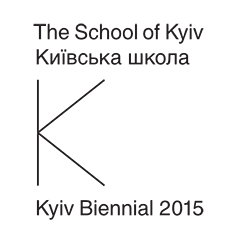The Pogrom at Visual Culture Research Center: Right Wing Radicals Destroyed “The Lost Opportunity” exhibition by Davyd Chychkan
Video from surveillance camera inside the VCRC gallery space.
On Tuesday, February 7, at 17:40, approximately fifteen people broke into Visual Culture Research Center. They beat up the security guard, destroyed the exhibition «The Lost Opportunity» by Davyd Chychkan, stealing four artworks and heavily damaging others.
Dedicated to the war and post-Maidan situation in Ukraine, the exhibition «The Lost Opportunity» by Davyd Chychkan had opened in Visual Culture Research Center on Thursday, February 2. Threats to the artist and organizers, as well as calls to destroy the exhibition were subsequently posted on the social media pages of the far right groups and bloggers.
In order to guarantee safety of the visitors and the artist, we cancelled Davyd’s guided tour of the exhibition on Saturday, February 4 and closed it for the weekend. Despite the announced cancellation of the tour, and closed doors of the exhibition, a group of young men gathered in front of the VCRC entrance door (see photo). They severely beat up a passerby and attacked two visitors using a pepper spray. One of the visitors filed a complaint to the police. The mentioned individuals also broke and torn off the plastic sign and the advertising banner of the exhibition.
On Tuesday, February 7 the exhibition was reopened in accordance with its regular working hours. A young man was noticed observing the entrance doors to the exhibition. A member of VCRC asked whether he wanted to come in and the man answered that he would come back later. Because of his suspicious behavior and outfit that is typical for the far right subculture, the workers of Visual Culture Research Center called the police and closed the door, opening it only for each visitor.
Around 17:40 the security guard who was working at the exhibition together with the VCRC members, opened the door for three visitors to come in. About 15 people broke into the premises with their faces covered. They used a pepper-spray, encircling the security guard, threatening him, and demanding to lay on the ground. Eventually, several persons attacked the guard, punching him in the face, while the rest of the group were destroying the artworks and filming the action using their mobile phones. Trying to break into the office room, where VCRC members stayed behind closed door, yet not successfully, the group left, taking several artworks and books from the exposition.
Among the graffiti the attackers made on the walls, there is a trident (the emblem of Ukraine) that is shaped as a Celtic cross, proving that it was the neo-Nazis who carried out the attack. Until now, none of far-right groups in Ukraine or Russia claimed responsibility for the attack.
The police opened criminal investigation under Article 296 of the Criminal Code of Ukraine as “a hooligan act committed by a group of persons” that could be reclassified.
The exhibition presented ten graphic paintings by Davyd Chychkan. Four were stolen, while three were completely destroyed. Only two works survived the attack and one was slightly damaged. We preliminary estimate the losses of works at six thousand dollars. The damage of the Center (broken walls, destroyed protective shield, a broken heater, etc.) are estimated at one thousand five hundred dollars.
«The Lost Opportunity» exhibition by Davyd Chychkan, organized by the Visual Culture Research Center, is dedicated to the war and post-Maidan situation in Ukraine. «The Lost Opportunity» poses the questions that have been in the air for more than three years: what was this event and what it could have become? According to the artist, Maidan is a lost opportunity for the Ukrainian society to accomplish a social revolution, which would mean not only to defend dignity, but rather finally gain dignified living conditions. In series of graphic works Davyd was exploring the reasons and reflecting on the consequences of this loss, among which the so-called «decommunization» phenomenon that crystallizes the traits of counterrevolution in the context of political ignorance.

